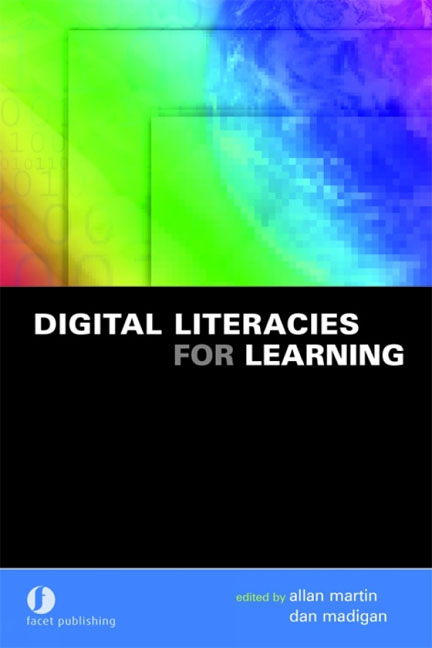Book contents
- Frontmatter
- Contents
- Dedication
- The contributors
- Foreword
- Preface
- Part I Literacies in the digital age
- 1 Literacies for the digital age: preview of Part 1
- 2 Learners, learning literacy and the pedagogy of e-learning
- 3 Real learning in virtual environments
- 4 Digital fusion: defining the intersection of content and communications
- 5 Literacy and the digital knowledge revolution
- 6 Understanding e-literacy
- 7 Information literacy – an overview
- 8 Contemporary literacy – the three Es
- 9 Reconceptualizing media literacy for the digital age
- 10 Literacy, e-literacy and multiliteracies: meeting the challenges of teaching online
- 11 Graduate e-literacies and employability
- Part II Enabling and supporting digital literacies
- Index
4 - Digital fusion: defining the intersection of content and communications
from Part I - Literacies in the digital age
Published online by Cambridge University Press: 08 June 2018
- Frontmatter
- Contents
- Dedication
- The contributors
- Foreword
- Preface
- Part I Literacies in the digital age
- 1 Literacies for the digital age: preview of Part 1
- 2 Learners, learning literacy and the pedagogy of e-learning
- 3 Real learning in virtual environments
- 4 Digital fusion: defining the intersection of content and communications
- 5 Literacy and the digital knowledge revolution
- 6 Understanding e-literacy
- 7 Information literacy – an overview
- 8 Contemporary literacy – the three Es
- 9 Reconceptualizing media literacy for the digital age
- 10 Literacy, e-literacy and multiliteracies: meeting the challenges of teaching online
- 11 Graduate e-literacies and employability
- Part II Enabling and supporting digital literacies
- Index
Summary
Abstract
As publishing increasingly becomes an online venture, changes in the nature of information are emerging. ‘Content’, normally considered to be professionally published material such as books and movies, is merging with ‘communications’, usually considered to be informal and represented by letters, telephone calls, etc. This chapter analyses trends in digital information and concludes that new research opportunities are evolving from this unusual access to materials. The growth of scholarly preprints to augment traditional peer review and the availability of connected resources including wikis, weblogs, mailing lists and online journals connecting to ‘halos’ of imagery and data – and perhaps one day to a new form of e-mail archive – are symptomatic of this evolution.
Introduction
The internet's great utility for scholars, educators and lay researchers has been opening access to information in venues outside the traditional library. Those whose lives have revolved around books and journals now find themselves able to work with numerous scholarly materials once restricted to reference departments, and to do so from the office or the home. That this revolution in access is not complete need hardly be reiterated – all too many journals, and all too many useful documents in older issues of available journals, have yet to be placed online.
Here we consider how this extension and transformation of our tools is proceeding, and what will be needed to make it more useful. The boundaries of research are changing to incorporate materials once considered outside the realm of traditional scholarship. The burden is thus placed on the scholarly community – as well as those who toil in our libraries – to master a changing set of skills. There is little help in this, as the technology advances at a rate exceeding the best efforts of educators to revise and reform existing curricula. Today's researcher will be increasingly selftaught or forever toiling to catch up.
Redefining the collection
The evolving resources of the net need not confound us; indeed, they resemble more traditional venues in important respects. ‘The Web’, says Bonita Wilson in the online D-Lib Magazine (2005), ‘is enabling the creation of personalized – yet networked – collections of materials and services that in some ways resemble library special collections.’ D-Lib Magazine cites, for example, the growth of tools like Connotea, which creates online collections of bookmarks, a new kind of community allowing scholars to share sources (Hammond et al., 2005).
- Type
- Chapter
- Information
- Digital Literacies for Learning , pp. 42 - 50Publisher: FacetPrint publication year: 2006
- 4
- Cited by



